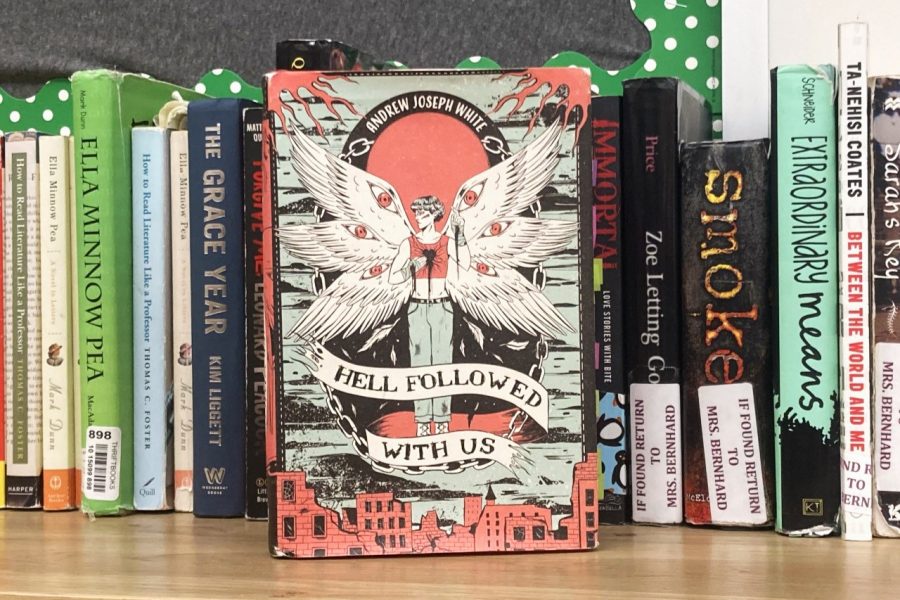“Hell Followed With Us” by Andrew Joseph White (Review)
Taking Notice: A copy of the novel ‘Hell Followed With Us’ stands heavily annotated. Many memorable scenes and lines were impossible to leave unmarked.
November 18, 2022
Brimming with bloody cities and justified teenage fury, the new novel Hell Followed With Us, by Andrew Joseph White, was released over the summer. Now a New York Times Bestselling novel, it was published on June 7th by the Peachtree Teen organization.
This review is spoiler-free.
Following the teenage protagonist, Benjamin Woodside, or “Benji,” Hell Followed With Us creates a brutal new world within fictional Acheson, Pennsylvania. In a post-apocalyptic future, a religious eco-terrorist group self-titled the ‘Angels’ has bio-engineered a deadly virus called the ‘Flood’ that has killed most of humanity. Benji, the gay, transgender son of the cult’s matriarch, attempts to flee from the nightmare in which he was raised. He is rescued by the Acheson LGBTQ+ Center, but running proves futile, as Benji has already been infected by a mutated strain of the virus called “Seraph” that was designed to create the cataclysm for the Angels’ cause.
As readers follow Benji through Acheson, they find that almost every character in Hell Followed With Us is confirmed to be queer. This is a delightful change of pace as queer characters are often demonized, stereotyped, brushed off, or created as diversifying afterthoughts, especially in horror. Every character is portrayed as powerful, regardless of their race, gender, or sexuality. This inclusivity allows the novel to maturely explore themes of self-discovery and self acceptance alongside the more thriller-appropriate fight to survive. Any readers who currently find themselves questioning their own identities can relate to at least part of the protagonist’s emotional struggle.
This book’s inclusivity may partially be attributed to the fact that the author, Andrew Joseph White himself is a trans man. This makes the novel an ‘own voice’ novel, meaning the identities and experiences of the characters reflect those of the author. White knows the pain that comes with having to fight to be treated fairly, and these experiences are portrayed cuttingly in Hell Followed With Us. His experiences bleed into many of his other stories as well. Both of his published short stories star trans men combating abuse. White recently tweeted the announcement for his upcoming book, The Spirit Bares Its Teeth, a historical fiction novel that also stars a trans male character.
Hell Followed With Us, though a brilliant debut novel and a compelling read, is unfortunately not quite for everyone. White has provided relevant content warnings in the first pages of his novel for readers who may be sensitive to intense gore, transphobia, religious and domestic abuse, suicide attempts or self-injury. It also features potentially triggering descriptions of illness, i.e. vomiting, decay, death, and body horror, as well as mild and inexplicit sexual content. These warnings should be carefully considered by interested readers.
White’s novel is a brilliantly sharp showcase of the power of channeled anger as well as a commentary on abusive religion. It features heavy mutation and manipulation undergone by the main character at the hands of the Angels, which parallels the abuse many members of the LGBTQ+ Community tend to face in religious settings. Throughout the story, Benji’s emotional growth is confronted at every turn by the ideals the cult has instilled in him. At the end of chapter five, he questions “How much of it is me, and how much of it was put there?” Though this is in reference to the virus mutating him, it relates very keenly to the struggles that come from forming a mentality that conflicts with what a person’s been accustomed to. Even the cult’s name, ‘Angels’, reflects the harmful evangelicalism and ‘carrying out of God’s will’ that exists in some religious settings in the real world. Hell Followed With Us validates rage towards an unjust situation, especially religious abuse, a topic novel writers tend to delicately dance around. White lets his characters get banged up and furious about it, and that’s a large part of the appeal for this story. It’s everything from gory fight scenes to hesitant teenage strangers-to-friends-to-lovers romance. White has used his caustic writing style to create a beautiful, satisfying message for young people, encouraging weaponized wrath against oppressors being used for good.
Quickly shooting up in the literary world, Hell Followed With Us has vivid and gorgeously grotesque writing, giving the novel a unique atmosphere and drawing in its audience. However, it seems that a few areas of the plot have remained unexplored. As mentioned briefly by the New York Times, there are a few crucial questions that remain unanswered that could have added more to the intrigue of the story. Hell Followed With Us also focuses intensely on the protagonist, while largely ignoring the relationships of the surrounding characters. The side characters all have very distinct and interesting personalities that warrant further exploration, only adding to the disappointment at their semi-exclusion. Regardless, the novel is enjoyable and brilliant, with a contrarian finale leaving readers ready to take on their own Angels.
Hell Followed With Us is a fantastic read for anyone seeking a compelling, gory thriller this Halloween season. So if you’re looking for a novel filled with queer teenagers trying to find a way to survive with no one but each other on their side, this novel is the right pick. White knows what he’s writing, writes it well, and has created a new foothold in queer literature for trans kids who want to finally see themselves as the lead.
Disclaimer: Articles designated as “Review” represent the views and opinions of the author, not the Periscope staff, CHS/CASD administration, or the CHS student body.






























































































